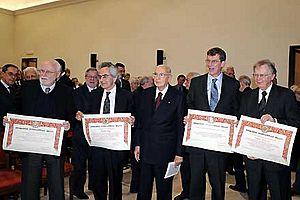Wallace Smith Broecker facts for kids
Quick facts for kids
Wallace Smith Broecker
|
|
|---|---|
 |
|
| Born | November 29, 1931 Chicago, Illinois, U.S.
|
| Died | February 18, 2019 (aged 87) New York City, U.S.
|
| Citizenship | American |
| Alma mater | Columbia University (BA, PhD) |
| Known for | Global Warming |
| Spouse(s) | Grace Carder Elizabeth Clark |
| Awards | Maurice Ewing Medal (1979) A.G. Huntsman Medal (1985) Vetlesen Prize (1987) Alexander Agassiz Medal (1986) Urey Medal (1990) Wollaston Medal (1990) Roger Revelle Medal (1995) National Medal of Science (1996) Tyler Prize for Environmental Achievement (2002) Crafoord Prize (2006) BBVA Foundation Frontiers of Knowledge Award (2008) Phi Beta Kappa Award in Science (2012) |
| Scientific career | |
| Fields | Geochronology, chemical oceanography, climate change |
| Institutions | Columbia University, Lamont–Doherty Earth Observatory; Arizona State University, Julie Ann Wrigley Global Institute of Sustainability |
Wallace "Wally" Smith Broecker (November 29, 1931 – February 18, 2019) was an important American scientist. He studied the Earth's chemistry, especially the oceans and climate. He worked as a professor at Columbia University and was a scientist at the Lamont–Doherty Earth Observatory.
Broecker helped us understand how the ocean currents move heat around the world, like a giant "conveyor belt." He also made big discoveries about the carbon cycle, which is how carbon moves through the Earth's systems. He was the first to make the term "global warming" popular. He won many awards for his work, including the Crafoord Prize.
Contents
About Wallace Broecker
His Early Life and Education
Wallace Broecker was born in Chicago in 1931. He went to Wheaton College (Illinois) for a while. There, he met his first wife, Grace Carder. Later, he moved to Columbia University. He earned his bachelor's degree in 1953 and his Ph.D. in 1958 from Columbia. While at Columbia, he worked at the Lamont Geological Observatory.
Popularizing "Global Warming"
In 1975, Broecker wrote an important paper. It was titled: "Climatic Change: Are we on the Brink of a Pronounced Global Warming?" This paper helped make the phrase "global warming" well-known. The term had been used before, but Broecker's work brought it to more people's attention.
His Family and Later Life
Wallace Broecker had eight children, seven grandchildren, and seven great-grandchildren. His first wife, Grace E. Broecker, passed away in 2007 after 53 years of marriage. He later married Elizabeth Clark in 2009.
Broecker died on February 18, 2019, from heart failure. Just before he passed away, he shared a message with other scientists. He urged them to work faster to stop global warming. He also encouraged them to look into "more extreme solutions" for the climate crisis.
Broecker's Important Research
Broecker's research covered many areas. He studied the Earth's past using geochronology. He also used radiocarbon dating to figure out the age of things. A big part of his work was in chemical oceanography. This involved studying how chemicals move and mix in the ocean.
He researched the biogeochemical cycle of carbon. This is how carbon moves between the atmosphere, oceans, land, and living things. He also studied how climate change is recorded in ice and ocean sediments.
The Ocean's "Conveyor Belt"
Broecker wrote over 500 articles and 17 books. He is famous for discovering how the ocean plays a role in sudden climate changes. He developed the idea of a global "ocean conveyor". This is like a giant belt that links the circulation of all the world's oceans. This "conveyor" helps move heat and nutrients around the planet.
His work laid the groundwork for understanding the carbon cycle. His methods using radiocarbon to study ancient oceans are still very important. He also used chemical tracers to study the ocean. His textbook, "Tracers in the Sea," is still used by scientists today.
Broecker explained his research on how the ocean conveyor can change: "We have clear evidence that different parts of the earth's climate system are linked in very subtle yet dramatic ways. The climate system has jumped from one mode of operation to another in the past. We are trying to understand how the earth's climate system is engineered, so we can understand what it takes to trigger mode switches. Until we do, we cannot make good predictions about future climate change."
Awards and Honors
Wallace Broecker was a member of many important scientific groups. These included the American Academy of Arts and Sciences and the National Academy of Sciences. He was also a foreign member of the Royal Society.
He received many awards for his amazing contributions to science:
- A.G. Huntsman Award for Excellence in the Marine Sciences (1985)
- Crafoord Prize in Geoscience (2006)
- National Medal of Science (1996)
- Maurice W. Ewing Medal
- Alexander Agassiz Medal
- Urey Medal
- V. M. Goldschmidt Award
- Vetlesen Prize
- Wollaston Medal
- Roger Revelle Medal
- Tyler Prize for Environmental Achievement
- Blue Planet Prize
- Benjamin Franklin Medal in Earth and Environmental Science (2008)
- BBVA Foundation Frontiers of Knowledge Award in Climate Change (2008 and 2009)

In 2008, Broecker also received the Balzan Prize. This award recognizes outstanding achievements in science.
He also received honorary doctorates from several famous universities. These included Cambridge University, Oxford University, and Harvard University.
See also
 In Spanish: Wallace Smith Broecker para niños
In Spanish: Wallace Smith Broecker para niños
- Carbon dioxide removal#Artificial trees
- List of geophysicists
 | Dorothy Vaughan |
 | Charles Henry Turner |
 | Hildrus Poindexter |
 | Henry Cecil McBay |

